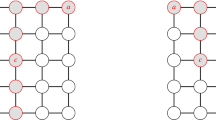Abstract
The surveillance game [Fomin et al., 2012] models the problem of web-page prefetching as a pursuit evasion game played on a graph. This two-player game is played turn-by-turn. The first player, called the observer, can mark a fixed amount of vertices at each turn. The second one controls a surfer that stands at vertices of the graph and can slide along edges. The surfer starts at some initially marked vertex of the graph, her objective is to reach an unmarked node The surveillance number sn(G) of a graph G is the minimum amount of nodes that the observer has to mark at each turn ensuring it wins against any surfer in G. Fomin et al. also defined the connected surveillance game where the marked nodes must always induce a connected subgraph. They ask if there is a constant c > 0 such that \(\frac{{\rm csn}(G)}{{\rm sn}(G)} \leq c\) for any graph G. It has been shown that there are graphs G for which csn(G) = sn(G) + 1. In this paper, we investigate this question.
We present a family of graphs G such that csn(G) > sn(G) + 1. Moreover, we prove that \({\rm csn}(G) \leq{\rm sn}(G) \sqrt{n}\) for any n-node graph G. While the gap between these bounds remains huge, it seems difficult to reduce it. We then define the online surveillance game where the observer has no a priori knowledge of the graph topology and discovers it little-by-little. Unfortunately, we show that no algorithm for solving the online surveillance game has competitive ratio better than Ω(Δ).
This work has been partially supported by European Project FP7 EULER, ANR CEDRE, ANR AGAPE, Associated Team AlDyNet, and project ECOS-Sud Chile.
The original version of this chapter was revised: The copyright line was incorrect. This has been corrected. The Erratum to this chapter is available at DOI: 10.1007/978-3-319-03578-9_29
Access this chapter
Tax calculation will be finalised at checkout
Purchases are for personal use only
Preview
Unable to display preview. Download preview PDF.
Similar content being viewed by others
References
Fomin, F.V., Giroire, F., Jean-Marie, A., Mazauric, D., Nisse, N.: To satisfy impatient web surfers is hard. In: FUN, pp. 166–176 (2012)
Aumann, Y., Etzioni, O., Feldman, R., Perkowitz, M.: Predicting event sequences: Data mining for prefetching web-pages (1998)
Albrecht, D., Zukerman, I., Nicholson, A.: Pre-sending documents on the www: a comparative study. In: 16th Int. Joint Conf. on Artificial Intelligence, pp. 1274–1279 (1999)
Mogul, J.C.: Hinted caching in the web. In: 7th Workshop on ACM SIGOPS European Workshop: Systems Support for World Wide Applications, pp. 103–108 (1996)
Wang, Z., Lin, F.X., Zhong, L., Chishtie, M.: How far can client-only solutions go for mobile browser speed? In: 21st Int. Conf. on World Wide Web, pp. 31–40 (2012)
Fan, L., Cao, P., Lin, W., Jacobson, Q.: Web prefetching between low-bandwidth clients and proxies: potential and performance. In: ACM SIGMETRICS Int. Conf. on Measurement and Modeling of Computer Systems, pp. 178–187 (1999)
Padmanabhan, V.N., Mogul, J.C.: Using predictive prefetching to improve world wide web latency. SIGCOMM Comput. Commun. Rev. 26(3), 22–36 (1996)
Kroeger, T.M., Long, D.D.E., Mogul, J.C.: Exploring the bounds of web latency reduction from caching and prefetching. In: USENIX Symposium on Internet Technologies and Systems, p. 2 (1997)
Giroire, F., Mazauric, D., Nisse, N., Pérennes, S., Pardo Soares, R.: Connected Surveillance Game. Rapport de recherche RR-8297. INRIA (2013)
Author information
Authors and Affiliations
Editor information
Editors and Affiliations
Rights and permissions
Copyright information
© 2013 Springer-Verlag Berlin Heidelberg
About this paper
Cite this paper
Giroire, F., Mazauric, D., Nisse, N., Pérennes, S., Soares, R. (2013). Connected Surveillance Game. In: Moscibroda, T., Rescigno, A.A. (eds) Structural Information and Communication Complexity. SIROCCO 2013. Lecture Notes in Computer Science, vol 8179. Springer, Cham. https://doi.org/10.1007/978-3-319-03578-9_6
Download citation
DOI: https://doi.org/10.1007/978-3-319-03578-9_6
Publisher Name: Springer, Cham
Print ISBN: 978-3-319-03577-2
Online ISBN: 978-3-319-03578-9
eBook Packages: Computer ScienceComputer Science (R0)




